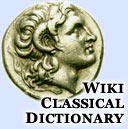
Review of Alexander
by Tim Spalding, editor of "Alexander the Great on the Web."
The No-Spoilers Review
If you've made it to my website, it's likely you have a more-than-passing interest in Alexander. If so, go ahead and see the movie. It's no Lawrence of Arabia, but anyone interested in Alexander will find a few things to like. And, even if it does well financially—which I doubt—you're still not going to get another full-blown Alexander movie for decades. Enjoy it while you can.
The rest of this review contains spoilers.
The Real Review
Oliver Stone's new movie Alexander follows the Macedonian conqueror from childhood to death at 32. Colin Farrell plays Alexander as a headstrong dreamer, passionate, violent, and with some humdinger family issues. Val Kilmer's Philip is Alexander's father—harsh but also amiable and a bit limited. Angelina Jolie plays Alexander's mother Olympias with the same freaky, controlling spite that she brought to the freaky, controlling mental patient in "Girl, Interupted." She is attended by various snakes and a sexy if over-the-top Slavoid accent. Rosario Dawson plays Alexander's eventual wife Roxane, chiefly memorable for a naked scene. Jared Leto, the gorgeous but dim boy in "My So Called Life," plays Alexander's lifelong alter ego Hephaestion. A truckload of actors have jobs as Alexander's mentors, friends and companions. Anthony Hopkins plays the elderly Ptolemy, one of Alexander's generals, dictating his history of Alexander to scribes, and providing voice-over narration.
Uncredited stars include luxurious palaces, snowy mountains and steaming jungles. There are huge armies, mad cavalry charges, slingers, archers, chariots with blades extending from the wheels, and enranged elephants with blood all over their tusks.
Sounds great, doesn't it? Unfortuately, it isn't.
Blah Blah Blah
Alexander could have been good. The sets have scale and grandeur. There's violence and passion, with at least one good battle scene, and I didn't blink much during the sex scene either. The picture of Alexander is dramatic and emotional. The events of Alexander's life are not quite what you'd expect, but compelling in the abstract. The actors are a talented bunch.
Then they open their mouths. And out spills the dialogue—tedious, pedestrian, obvious and oh-so-lengthy. My father, who came to the preview with me, called it "horrible slurpy crap." I wish I could give you some samples but, scribbling in the dark at the premiere, I couldn't get full paragraphs down. Instead I scribbled pretentious gems like "It was from these loins of war that Alexander was born in Pella," summaries like "Incoherent speech at the Hydaspes" and long scribbles of "blah blah blah." The last is the best summary.
I found myself imagining a better movie, shot-for-shot the same, but with intelligent, concise and effective dialogue subbed-in. It wouldn't have been a masterpiece, but it would have been good. It would had had some tension, and you would have cared about the characters. Perhaps something can be done when the Japanese translation comes out.[1]
But is it historical?
Historical movies can become divorced from the history they are said to dramatize. Richard Burton's "Alexander" (1956) feels like some other story, with Greek outfits and names grafted on. It isn't about Alexander, it's about "Alexander." This is not the case with Oliver Stone's version.
Don't get me wrong. There are errors of fact and interpretation. Some follow from choices of compression or for dramatic reasons. Some have no excuse. But the major outlines are there, the major themes, and even most of the characters.
Stone did what?
Online discussion about the film's history has focused on what Stone leaves out, which is a lot. Surprise-surprise, but everything between Philip's murder and the Battle of Gaugamela happens off-stage. We get no Battles of Granicus and Issus, the siege of Tyre or the visit to Siwa. In many versions, these are the center of Alexander's story. Instead, we get the young Alexander, buffeted by his coarse, incomplete father, and his pathological mother. And, after Gaugamela, we get the "late" Alexander, increasingly uncontrolled, and surrounded by plots.
Those who teach Alexander to college students could learn from Stone's choice, for it's an inspired one. The Alexander of Granicus and Issus is a big success, but repeated success can be boring. (I was overjoyed the Sox beat the Cardinals, but their matchups were snoozers.) Certainly, three pitched battles wasn't going to happen, so Stone chose the climactic one.
The unexpected emphasis also works through the order that Stone tells the story: At the start, Alexander is a boy, wrestling and taming horses. Alexander is a young man, challenging his father and quaking before his mother. Then, suddenly, it's Gaugamela, Babylon, Bactria. Now Alexander's marrying a Bactrian. (It's too bad modern Tajiks aren't all comely stick insects with breasts.) He pledges to give his soldier's women proper dowries, and then to bring their children up with Greek educations. The Macedonians don't like the sound of that, but the natives are giddy at the prospect. (The next shot should be a schoolroom of Uzbeks chanting "Luo lueis luei luomen luete luousi!") Now it's raining like hell and we're in India. The army's restless. Alexander's pushing hard (and monologuing to Hephaestion about how hard he's pushing). Then, Cleitus is shooting his mouth off about how Philip would have done it. Alexander grabs a spear and runs him through.
And suddenly we're back in Macedonia. Philip and Alexander are going to the theatre at Aegae. Philip wants to enter alone; he wants people to like him. Philip's murder follows, with Olympias watching unmoved. Soon Alexander's berating his mother in the palace and she spits out "You're a king. Act like one."
Again, it's good in theory. But the dialogue spoils everything. We don't care about what characters are saying, so we don't care about the characters. It's hard for me to see the film with others' eyes—I cared about Alexander before the film, so he plugged into something I already had. Even so, I didn't feel much for Alexander.
Slaughter in India
Many of the readers of "Alexander the Great on the Web" care most of all about military matters. I do not, but I aim to please. So, I can report that Gaugamela is competently done. Despite Stone's helpful titles—"Greek Left," "Greek Right"—it's very hard to make an ancient battle comprehensible. (Nor was it so to most participants.) But Stone captures the dust and slaughter well. And, don't worry—you get to see those nifty chariots Cuisinart some legs.
A even better battle scene comes later. It's a historical compression. Elephants are involved, like the Battle at the Hydaspes, in India, but Alexander gets an arrow to the chest like the battle of the Mallians. Whatever it is, it's glorious. There are certain scenes in film where you realize you've never seen that before. Do you remember the first time you saw the dinosaurs in Jurasic Park? Well, you've never seen maddened elephants charging into ranks of pikemen, or running along a Macedonian line snapping their wood sarissas like twigs. I, for one, have never seen an elephant get its trunk chopped off. If you've got stomach for this stuff, it's ghastly and glorious, exciting and tragic—and Stone milks it for all it's worth.
Timander and his brother Addaeus
There are some odd "nuggets" of authenticity here and there—a detail or quote that, to someone who knows the sources, cries out "look at me!" So, in a battle pep-talk Alexander singles out some soldiers for praise, including one Timander, whose brother Addaeus he mentions died at Halicarnassus. Sure enough, these minor characters appear in the sources, and Alexander has named almost everything we know about them. Or, take Ptolemy's gloss on Alexander's relationship with Hephaestion, that "Alexander was only defeated once, and that was by Hephaestion's thighs." It's an authentic quote, albeit from a much later source.
In itself, these "nuggets" don't amount to much. Timander and his brother are a throw-away. And except for the fact that it's one of the few well-written lines, the bit about Hephaestion's thighs could have been invented. But, there's an earnestness here. Stone cares about details. He cares about the history.
The newspaper reviewers I saw the movie with came out of the theater with a basic question: "What was that about?" Was it "empires are hard to rule"? or "being a king is tough"? Other answers could be multiplied: "Parents screw you up," "Orientals screw you up, but multiculturalism is swell." "Slow down, don't drink too much."
Here is my answer: Despite some contemporary resonances, the movie is funamentally about Alexander—who he was and what he meant. For a Hollywood movie, I'm sorry to say, that's a bad idea.
The Movie that Eats Like a Book
At times, Alexander feels less like a film of Alexander's life than a film of a modern scholarly book about Alexander. I refer not to the quality of the facts, but to some odd tics.
There are some questions historians can't answer with the available data. So, we aren't surprised if a Peter Green or Robin Lane Fox declines to state definitively why Alexander married the Sogdian princess Roxane. It's something else when, in the film version, the voice-over is equally non-committal and we are dutifully read a list of possible reasons. Roxane is one of the more important characters in the film; she and Alexander have a half-dozen scenes together. You would think the drama should settle such questions, but I'm still not sure why he married her. More importantly, I don't care.
The same goes for Alexander's death. Asked to whom he leaves his empire, Alexander says something inaudible. I didn't hear it anyway, nor do the officers around him. They puzzle "The best one of us?" "Craterus?" "Cleitus?" This isn't edgy indeterminacy, it's a failure to make choices.
The Bored Scribe
Like Stone's movie, modern studies of Alexander are much interested in what sort of man Alexander was. The source-tradition allows different interpretations, and scholars have drawn wildly differing portraits—from the gallant statesman to the genocial thug. In making his movie, Stone had to choose one. His Alexander is an outsized dreamer—passionate, violent and flawed, but great.
Stone's choice is clearly drawn. Alexander comes across just so. Yet Stone ends the movie with Ptolemy ambling around, blathering about how passionate he was, how violent and flawed, but ultimately how great--and what a dreamer! He shouldn't be judged too harshly, he did great things. Blah blah blah. Finally Ptolemy stops, decides that he's blathering, and asks the scribe to throw that part away. Then he starts again. To my eye, the scribe looked bored and put-upon.
Maybe I'm projecting; that's certainly how I felt.


Wiki Classical Dictionary, currently focused on Alexander
All material © 2000–2005 Tim Spalding.
Presented in Association with Amazon
If you enjoy this site you may also like these other sites by me:
Genghis Khan on the Web More than 275 links about the Mongol conqueror.
Cleopatra on the Web Over 410 resources on Cleopatra. Includes 168 images.
Ancient Library and the Wiki Classical Dictionray, major new reference sources for ancient studies.
Hieroglyphs! Over 125 links about Egyptian hieroglyphs for all ages and levels of knowledge.